June 22, 1941. The first day of the war
The following abbreviations are used in the article: IN - military district, GSh - General base, SOBOVO - Western Special VO, Spacecraft - Red Army, CBF - Red Banner Baltic Fleet, Cova - Kiev Special VO, NCOs - People's Commissariat of Defense, OdVO - Odessa VO, Pribovo - Baltic special VO, Goals Difference - intelligence materials, sd - rifle division, BSF - Black Sea Fleet.
Earlier it was said that the events of June 22 can be judged based on memories that contradict each other and on a few documents.
In the previous part, it was shown that after leaving Stalin's cabinet at 22:20, the leaders of the spacecraft did not believe in the start of the war on June 22. At 23:00, Beria left the office, who also does not expect the start of the war. Therefore, on the night of June 22, part of the border guards were resting at the outposts, which were unexpectedly fired upon by artillery or machine-gun fire.
The events were considered from 3 to 4 am on June 22nd. At 4:01 am S.M.Budyonny calls the People's Commissar of Defense. After a short conversation, Marshal Budyonny enters the office of the People's Commissar, calls Stalin, passes the phone to S.K. Timoshenko and leaves the office.
Memoirs of G.K. Zhukov
Many memoirs are based on the memoirs of G.K. Zhukov. Therefore, we will consider how the events took place according to this version:
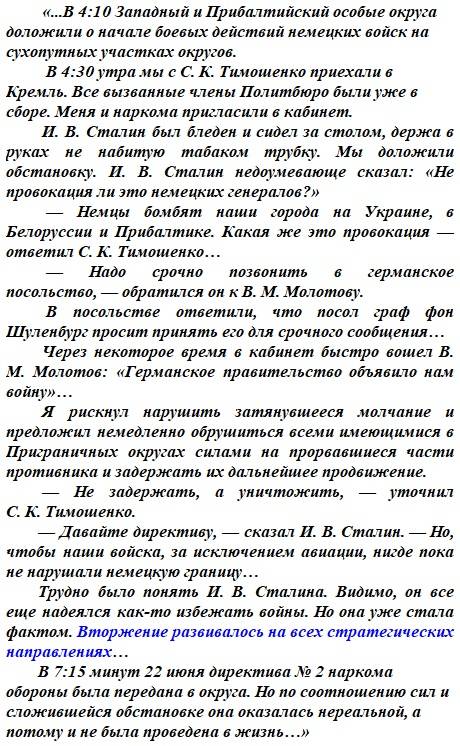
From the memoirs it follows that S. K. Timoshenko and G. K. Zhukov arrive in the Kremlin at 4:30 and will be in the office until 7: 15–8: 20.
At this time, allegedly, all the summoned members of the Politburo are in Stalin's office.
However, at 5:45 am there will be only two members of the Politburo of the Central Committee of the All-Union Communist Party of Bolsheviks: Stalin and Molotov.
Having learned about the war from the military, Stalin allegedly spoke about a call to the German embassy. When you call the embassy, you will learn about the ambassador's desire to meet for an urgent message.
Therefore, we should not talk about 4:30, but about the time interval from 5: 00–5: 20. When Molotov returns from a meeting with the German ambassador, there should be members of the Politburo and the military in the office, but again this is not true ...
Before the meeting with Stalin, the KA leadership still had a poor idea of the situation in the border districts. They do not know about the invasion of large German strike groups in all strategic directions and about the outbreak of hostilities along the entire Soviet-German border ...
If the People's Commissar of Defense and the Chief of the General Staff are involved in drafting Directive No. 2, then how can you write that according to “The balance of forces and the current situation [directive - Approx. auth.] turned out to be unreal, and therefore was not implemented ... "
Why is the KA leadership writing such an unrealistic directive?
Most likely, when preparing the text, the leaders of the spacecraft were confident that the directive was correct, since they did not represent the real picture of the events taking place at the border. Indirectly, this is evidenced by the fact that even on the evening of June 21, they do not expect a full-scale war with the Germans.
Therefore, after leaving Stalin's office at 22:20, the People's Commissar of Defense and the Chief of the General Staff did nothing to withdraw the troops to their positions to the border, occupy the UR structures (load ammunition and food into them) and disperse Aviation before admission to the districts of Directive No. 1.
At about 4 o'clock in the morning, the head of the Main Directorate of Air Defense N.N. Voronov had the impression that the People's Commissar of Defense did not believe in the possibility of starting a war with Germany.
Early morning in the Kremlin
We do not know what Stalin was doing, members of the Politburo of the Central Committee of the All-Union Communist Party of Bolsheviks and the Government from 4:05 to 5:45.
According to Stalin's visit log, the first visitors entered the office at 5:45 am. They were Molotov, Beria, Timoshenko, Mekhlis and Zhukov.
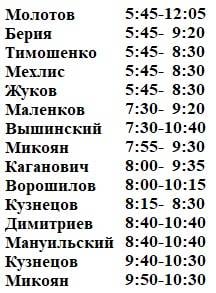
Probably, after a call from L.P. Beria, the leader decides to leave for the Kremlin. From 4 a.m. Stalin and Beria have been in the Kremlin, and there is no information about their meeting until 5:45 a.m. ...
In the memoirs of Stalin's visitors, there is a mention that in the reception room, in addition to A. N. Poskrebyshev, was located the head of the security, General N. S. Vlasik, and there was a third table for another employee of the secretariat.
Perhaps we do not know about Stalin's visitors until 5:45 am due to the absence of an employee who was supposed to keep the journal, or did Stalin's meetings take place in a different room?
After 4 o'clock in the morning, the People's Commissar of Defense reports to Stalin about the raid on Sevastopol.
LP Beria and GM Malenkov were engaged in the raid on Sevastopol until 4 o'clock, who were also supposed to report their investigation to Stalin.
However, Malenkov appears in his office only at 7:30. It is possible that the meeting took place earlier, and then G.M. Malenkov, on Stalin's instructions, clarifies the situation in the western regions from the party leadership.
Somewhere after four o'clock, the commander of the troops of the Moscow Military District, General Tyulenev, appears in the Kremlin, with whom Voroshilov is interested in the question of the availability of shelters for the government.
Voroshilov will appear in Stalin's office only at 8:00. It is possible that he had previously met with Stalin and subsequently carried out some of his assignments.
At around 5 o'clock in the morning, the Chekists could inform Molotov of the desire of the German ambassador to meet with the People's Commissar for Foreign Affairs. Before meeting with the ambassador, Molotov also did not officially meet with Stalin, although the leader had to give him some instructions ...
At the present time, we do not know anything about Stalin's meetings before the first official meeting in his office ...
Early morning at an NGO
The People's Commissar of Defense and the Chief of the General Staff in the early morning of June 22 have little accurate information from the western districts about the events on the border. At the same time, the received information for the most part does not correspond to reality.
Among those published there is a message from the Military Council of the North-Western Front to the People's Commissar of Defense with the situation at 6:10. Suppose that the People's Commissar of Defense managed to bring this information to 5:40 (the estimated time of his departure to the Kremlin):
Tanks the enemy is advancing - Taurage [later they will report about 50 tanks, the attack of which was repulsed - Approx. auth.]. The infantry is advancing - Shaki (up to the regiment), Vishtynets and Kalvariya forces are being specified. He gave the order to throw out the enemy with counterattacks and capture them. Our air force is in the air ...
There is nothing threatening in the message. Some forces are advancing. On one of the directions - "to the shelf". Something is happening in the air. The commander of the troops of the district gave the order to throw out the enemy and capture them.
It cannot be concluded from the message that a full-scale war has begun and that the situation on the border is threatening.
Messages received from other VOs can be judged by Operational summary of the General Staff No. 01 at 10:00.
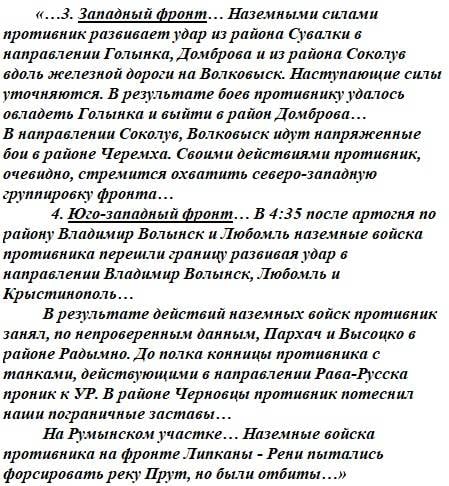
There is also nothing threatening in the report prepared 6 hours after the start of the war. The setting outlined in this summary will be discussed in more detail later.
Due to the inability to contact the leaders of the spacecraft and with Stalin, the People's Commissar of the Navy Admiral N. G. Kuznetsov forced to make independent decisions:
At 6:00, Admiral N.G. Kuznetsov sends a new directive: “Military councils of KBF, Black Sea Fleet. I order to carry out defensive mine laying ... "
Stalin's office. Early morning
At 5:30, the People's Commissar for Foreign Affairs began to receive the German ambassador with adviser Hilger, and at 5:45, Molotov enters Stalin's office.
G. Hilger:
Leaving the Kremlin, we noticed a number of cars in which it was possible to distinguish the generals ...
It turns out that the leaders of the spacecraft arrived in the Kremlin by the beginning of the meeting.
Probably, first Molotov spoke about the meeting with the German ambassador, and then the leaders of the spacecraft reported on the situation at the border.
Goebbels' radio show began at 6:30.
At 6: 55-7: 00, the office could receive information about Goebbels' final words about the campaign against the USSR.
Somewhere around 7:15 in the office they begin to compose the text of Directive No. 2. There are two copies of this directive, differing from each other.
Judging by the edits, the copy shown in the figure was written first.
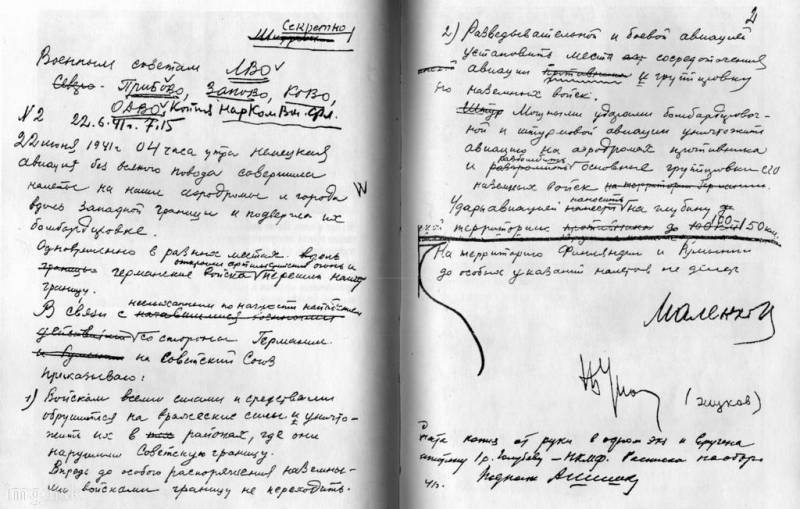
It can be seen that the text is drawn up directly in the office. This is evidenced by the clarifying wording in a number of amendments. The copy bears the signatures of Malenkov and Zhukov.
Historian S. L. Chekunov on the site forum Militera answered questions on Directive No. 2:
The original signed document contains just such corrections. That is, the "draftsman" redrawn and corrected ...
Question: “T. Vatutin. Romania - to bomb. " And someone's signature ... "
S. L. Chekunov: "This is Zhukov's autograph" ...
Thus, the first figure shows one of the copies.
The second copy of the directive has no edits. There are no signatures on the front side.
The second copy probably passed through the cipher organ. This can be evidenced by pencil marks with the numbers of the parts of the cipher telegram.
Again, Stalin does not edit the document with his own hand, but the text contains diplomatic delights: do not raid the territory of Finland and Romania until special instructions, strike with aircraft to the depth of German territory up to 100-150 km, destroy enemy forces in areas where they violated the Soviet border ...
After a discussion in the office, a decision is still made to bomb objects on the territory of Romania, but the prepared text of the directive is not corrected. On the back of the last sheet, the Chief of the General Staff writes: "T. Bomb Vatutin Romania " and in a hurry signs.
Thus, General N.F. Vatutin is entrusted to prepare instructions for the Air Force on the bombing of objects on the territory of Romania.
Probably, one of the employees of the NGO is called to the reception, who arrived with the leaders of the spacecraft, to whom Directive No. 2 is transferred.
At 8:10, the encrypted Directive No. 2 was transferred to the ZAPOVO, and at 8:20, the spacecraft leadership leaves Stalin's office.
Events outside the Kremlin
At 6:30 A.S. Shcherbakov, 1st Secretary of the Moscow City Committee of the All-Union Communist Party of Bolsheviks, convened a meeting of the leaders of Moscow, at which priority measures were developed to ensure the life of the capital in wartime. A concept was formulated for disguising Moscow, including the construction of models and dummies, protection of government and historical buildings.
At 15:00, a decision is made to install anti-aircraft batteries at all high-altitude points of Moscow.
After half past twelve, the issue of shelter for government agencies was decided.

After the outbreak of hostilities, the Romanian military declared war on the Soviet Union.
USSR envoy to the Kingdom of Romania A. I. Lavrent'ev:
I noticed that, as can be understood from the message made, Romania is breaking off diplomatic relations with the Soviet Union, proceeding from the above considerations.
To which Lecca replied that he had forgotten to say that hostilities between Germany and the Soviet Union had already begun. Romania, as an ally of Germany, sided with the latter ...
Still without instructions, the People's Commissar of the Navy sends directives on the action of submarines:
9:29 Military Council of the Black Sea Fleet. Send submarine submarine:
1) to the area between Constanta and Sulina,
2) between Constanta and Burgas inclusive, without disturbing the transport routes of Bulgaria, Turkey.
Objective: to interrupt communications, to act exclusively on TR TR and on Romanian and German warships.
Direct approaches to Constanta and Sulina boats are not put in mind of the forthcoming shelling operation by surface ships. Kuznetsov
According to one of the versions, the leader of the destroyers "Moskva" was torpedoed by the submarine Shch-206. If this is true, then it turns out that for reasons of secrecy or in a hurry, the information about the possible shelling of Constanta by our ships in a few days was not brought to the captain of the boat.
USSR Ambassador to the Kingdom of Italy N.V. Gorelkin:
“In view of the current situation, due to the fact that Germany has declared war on the USSR, Italy, as an ally of Germany and as a member of the Triple Pact, also declares war on the Soviet Union from the moment German troops entered Soviet territory, that is, from 5:30 22 June ...
Preparation of the text of V. M. Molotov's speech
At 10:40, Stalin and Molotov remain in the office, and Voroshilov joins them.

Probably, from that time on, a draft of Molotov's radio speech was being edited, which was prepared by the People's Commissar right there in his office.
V.M. Molotov (from F. Chuev's book "One hundred and forty conversations with Molotov"):
He didn’t want to be the first, he needed to have a clearer picture, what tone and what approach ...
As a politician, he had to wait and see something, because his manner of speeches was very clear, and it was impossible to get his bearings right away, to give a clear answer at that time. He said that he would wait a few days and speak when the situation on the fronts became clear.
- Your words: “Our cause is just. The enemy will be defeated, victory will be ours, ”became one of the main slogans of the war.
- This is the official speech. I composed it, edited it, all members of the Politburo participated. Therefore, I cannot say that these are only my words, there were amendments and additions, of course ...
From 11:30 to 12:00, Beria and Malenkov are in the office, who could report newly received information. Probably, based on this information, the text could be corrected. Beria and Malenkov could participate in the discussion of the text of the speech.
Apparently, from 12:00 to 12:05, Stalin gives the last instructions to Molotov.
At 12:15 PM Molotov speaks on the radio. His speech lasts about five minutes.
At 12:25 pm, Molotov returns to Stalin's office.
Below is a list of Stalin's visitors after Molotov's return.
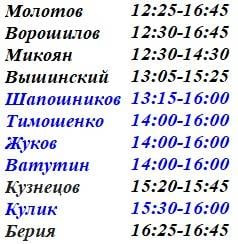
Conversation questions
Ya.E. Chadaev (the head of the Council of People's Commissars) recalled:
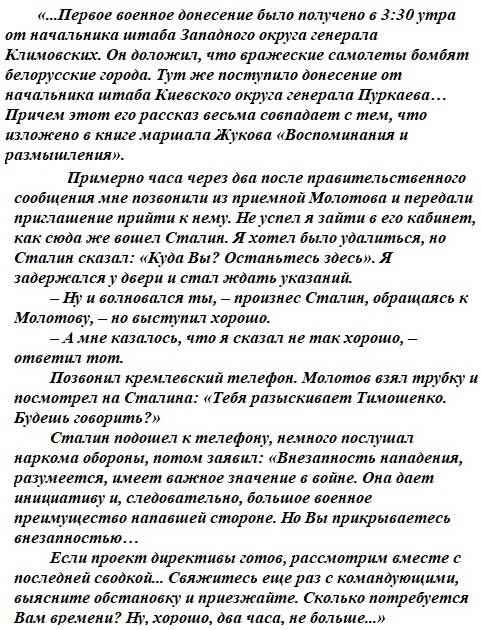
In the memoirs of Ya. E. Chadayev, the version from the memoirs of G.K. Zhukov about calls from the districts from 3:30 is repeated. Therefore, use the information provided only after analyzing it.
In the memoirs, there are inconsistencies in time with the journal of Stalin's visit.
"About two hours after the government speech" the conversation between Molotov and Stalin could not take place, since the People's Commissar for Foreign Affairs was in the leader's office from 12:25 to 16:45.
It is unlikely that Stalin would have waited 4 hours and 20 minutes to express his opinion to Molotov about his performance.
Even if we assume that after 16:45 Stalin entered Molotov's office, in which the conversation took place, in this case the leaders of the KA should have arrived at Stalin with a directive at about 18:50. However, the next meeting with Stalin took place on June 23 at 3:20 am.
It should be noted that Ya. E. Chadayev repeatedly entered the office at Stalin's summons, and his entrance and exit was not recorded in the journal.
It was also with A. N. Poskrebyshev in Stalin's office.
Most likely, the conversation between Stalin and Molotov took place immediately after the return of the People's Commissar for Foreign Affairs from the radio.
Before that, Chadayev was invited to Stalin to set a task, and therefore he was a witness to the conversation.
This is indirectly confirmed by Ya.D. Chadayev himself:
- It is necessary to organize the registration of all unfinished, empty and other premises that can be used for evacuated enterprises ...
I immediately left the office and began to carry out Stalin's instructions ...
It turns out that four hours after leaving Stalin, the leaders of the spacecraft, after pondering the situation, did not find anything threatening in the messages from the western military units.
In a conversation with Stalin, the People's Commissar of Defense, just in case, emphasizes the surprise of the attack, which led to some losses and the invasion of the enemy in some directions.
Tymoshenko promises to submit some directive and summary in two hours. Perhaps it was about submitting a directive and a summary no later than two hours later.
Working out plans in non-profit organizations
Before coming to Stalin (at 14:00), the General Staff had to work out some kind of plan to counter the enemy.
If the call of the People's Commissar of Defense to Stalin took place at about half past twelve, it turns out that at this time the General Staff is working out plans for strikes in accordance with the future Directive No. 3, which looks quite logical.
The plans being worked out in the General Staff envisage strikes by mechanized corps of three districts on Suwalki and in southern Poland on Lublin.
Probably, these strikes are being worked out on the basis of pre-war plans and on the RM existing at that time. The last RMs were on June 20 and left their mark on GSh map, marked "22.06.41 g."
Let us compare the information provided in Operational Report No. 01 at 10:00 on June 22.06.41, 20 with the May studies of the General Staff and from the RM on June XNUMX for each of the fronts.
North-Western Front
The General Staff's operational summary says:
According to intelligence, 500 tanks are about a tank brigade of two tank regiments as part of a tank division.
According to forecasts May studies of the General Staff, from East Prussia, the Germans could deliver the main blow with the southern grouping, and the supporting one with the northern one.
There are two maps with May elaborations:
- The scheme of the deployment of the troops of the Northern, North-Western, Western and South-Western fronts;
- Diagram of the balance of forces.

The figure below shows fragments of the Troop Deployment Scheme for the Northern, North-Western, Western and South-Western Fronts and a map with the plotted situation for June 20.
What should have been the conclusion of the General Staff when considering the messages received from the Baltic states?
Both directions of strikes, which were predicted in May, are true. The northern grouping is fully formed in 10 divisions (6 infantry, 3 motorized and one tank). There are about 9,5 divisions in the Southern grouping, that is, not all formations have yet been redeployed to the border.
The leadership of the spacecraft could have assumed that the situation in East Prussia was realized, as in the game in January 1941, when: "To the north of Brest, the" western ", not expecting the concentration of all their forces, in the interests of the main operation went on the offensive ..."
Therefore, our troops needed to strike as soon as possible on the flank of the southern grouping before it was fully concentrated ... The General Staff did not know that both enemy attacks were the main ones, and up to 40 German divisions were against the troops of the North-Western Front (taking into account the front reserves) ...
In accordance with the draft Directive No. 3, an order was to follow:
c) The armies of the Western Front, holding back the enemy in the Warsaw direction, inflict a powerful counterattack with the forces of at least two mechanized corps and aviation in the flank and rear of the enemy's Suvalka grouping, destroy it together with the North-Western Front and by the end of 24.6 capture the Suwalki area ...
In accordance with the available RM, the General Staff was confident that the enemy could oppose our attack on the Suvalka salient up to 7,5 divisions (4 infantry, 2 motorized, cavalry, tank regiment and tank battalion). As mobile reserves, the enemy could attract up to 4 tank regiments located to the west of the ledge.
The attacking groupings of the North-Western and Western Fronts in this direction consisted of three mechanized corps (9 divisions) and up to four rifle divisions.
In fact, there were 9 German infantry divisions on the ledge, and the 3rd tank group (7 tank and motorized divisions) was also introduced into the breakthrough.
The Western Front
The operational summary of the General Staff said:
In the direction of Sokolow, Volkovysk, intense battles are going on in the Cheremkha region. By its actions in these two directions, the enemy is obviously striving to cover the northwestern grouping of the front.
The front commander plans a counterattack in the direction of Golynka to destroy the enemy that has broken through ...
In the May studies, the German group against the ZAPOVO troops was estimated at 29 divisions (20 infantry, 3 tank, 3 motorized, cavalry and 2 airborne).
According to the RM, there were 20 divisions on June 30. The General Staff officers could be told that their assessment was close to reality. According to the May estimate, the General Staff in the ZAPOVO sector could have inflicted two concentric (secondary) strikes on Volkovysk.
The settlement of Holynka is located in the expected direction of the strike, and Dabrowa is located somewhat to the side. As, however, and Cheremkha.
The General Staff might think that they correctly guessed the enemy's actions in the northern and central sectors of the Soviet-German front.
Only the enemy inflicted concentric strikes not on Volkovysk, but on Bialystok ...
According to RM, a fairly large enemy grouping (11 divisions) is located in the Warsaw area and has not yet been redeployed to the border. In the Brest region there are 3 infantry divisions, a tank brigade (2 regiments) and 2 more tank regiments.
The General Staff understands that tank divisions are not only 2 tank regiments, but also two motorized infantry regiments, a motorized artillery regiment, a motorized anti-tank and anti-aircraft divisions, a motorized reconnaissance and sapper battalion, as well as many vehicles from supply transport convoys.
According to the ZapOVO intelligence, there were still three cavalry brigades in this area, of which two were border troops (without heavy weapons). Therefore, the General Staff and the headquarters of the Western Military District could consider that the 4 tank regiments, with cavalry instead of motorized infantry, without motorized artillery and supply columns, were not dangerous.
In addition, rifle and motorized corps were located against this grouping near the border ...
Southwestern front
The General Staff's operational summary says:
At 5:20 in the area of Chernivtsi near Karpeshti, the enemy also launched an offensive ...
As a result of the actions of ground forces, the enemy occupied, according to unverified data, Parkhach and Vysotsko in the Radymno area. The enemy cavalry regiment with tanks operating in the direction of Rava-Russk penetrated to the UR. In the area of Chernivtsi, the enemy pushed our border outposts ...
Enemy ground forces on the Lipcani-Reni front tried to force the Prut River, but were repulsed. According to unverified information, the enemy in the Kartal region landed an assault force across the Danube ...
In the May studies, the German group in southern Poland was assessed:
- according to the Scheme of deployment of troops of the Northern, North-Western, Western and South-Western fronts - in 38 divisions;
- according to the Scheme of the balance of forces - up to 85 divisions.
According to the RM, on June 20, there were 37–38 divisions in southern Poland. The direction of the expected main attack in southern Poland also seemed to be correctly assessed by the General Staff.
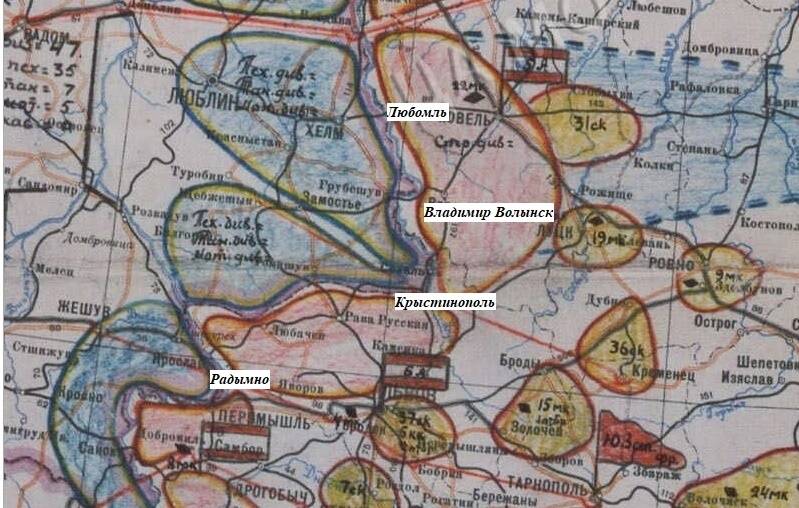
The ongoing actions of the enemy on the border with Romania cannot cause concern either.
A blow by a large group from Romania at the junction of KOVO and ODVO did not follow. An order was given to the headquarters of the 9th Army to concentrate both mechanized corps in the Chisinau region. An anti-tank artillery brigade can concentrate on the expected area of the strike ...
In accordance with the draft Directive No. 3, an order was to follow:
When striking five mechanized corps from the front section of the front Krystynopol - Novgorod-Volynsk to Lublin, in accordance with RM, our troops will be opposed by up to 14 German divisions (9 infantry, 2 tank and 3 motorized), of which part of the infantry divisions (outside the strike) will be shackled at the border by our rifle divisions.
According to the KOVO headquarters, on June 19-22, German troops in southern Poland were located relatively scattered.
In fact, there are 16 infantry and security divisions in this area, and the 1st Panzer Group (9 Panzer and Motorized Divisions) is being introduced into the breakthrough.
On the first day of the war, one of the problems suddenly appeared in front of the headquarters of the Southwestern Front.
I. Kh. Baghramyan:
The corps commander asked to immediately provide him with vehicles, without which the division would not be able to organize either the delivery of ammunition or the evacuation of the wounded.
The situation in the 25th motorcycle regiment, the corps communications battalion and the engineer battalion is even worse: they cannot perform at all - there is no transport.
We knew that the 15th mechanized corps was poorly equipped with equipment, but only now completely realized the consequences of this ... "
When planning strikes in accordance with Directive No. 3, the General Staff was hardly aware of such a problem either. Otherwise, they would not have established such a short time frame for the operation to seize the Lublin region ...
Probably, the General Staff did not know or did not think about other problems when organizing the introduction of mechanized corps into battle: the air supremacy of German aviation and the inability to obtain data from our aerial reconnaissance, poor communication or its absence, shortage of mechanized corps, limited service life of tanks, limited number of spare parts , fuel, armor-piercing and anti-aircraft shells.
The introduction of mechanized corps into battle in units with a limited amount of artillery and motorized infantry aggravated this situation ...
Directive No. 3
G.K. Zhukov, in his memoirs, denies his participation in the elaboration of plans in accordance with Directive No. 3 and again places responsibility for it on Stalin:
After 40 minutes I was already in the air ...
To the command post [of the Southwestern Front - Approx. auth.] arrived late in the evening ...
General NF Vatutin said that JV Stalin approved the draft directive No. 3 of the People's Commissar and ordered me to sign.
- What is this directive? I asked.
- The directive provides for the transition of our troops to counter-offensive operations with the task of defeating the enemy in the main directions, moreover, with access to the enemy's territory.
“But we still don’t know exactly where and with what forces the enemy strikes,” I objected. - Wouldn't it be better to sort out what is happening at the front until morning, and then make the right decision.
- I share your point of view, but the matter is settled.
- Okay, - I said, - put my signature ...
According to the visit log, G.K. Zhukov was in Stalin's office from 14:00 to 16:45. Probably, at this meeting, the main provisions of the plan proposed by the military were approved.
The text of Directive No. 3 could be prepared after the meeting.
Indirectly, this is evidenced by the words S. L. Chekunova: "In directive No. 3, instead of Zhukov's autograph, there is his surname," drawn "by Vatutin, which indirectly confirms the memoirs of GK Zhukov."
At 21:15 Directive No. 3 was sent to the troops.
Somewhere after 17 pm G.K. Zhukov flew to Kiev.
The flight time to Kiev of the transport aircraft "Douglas" at maximum speed is at least 2 hours. The distance from Kiev to Tarnopol along the road is about 440 km. It turns out that G.K. Zhukov with NS Khrushchev could arrive at the headquarters of the Southwestern Front somewhere on the night of June 23rd.
Since the chief of the General Staff was present at the discussion of plans for strikes on Suwalki and in southern Poland, his surname was put in encryption without his consent, since he was somewhere on the road, about which Vatutin was supposed to inform Zhukov.
From the front headquarters GK Zhukov speaks on high frequency with Vatutin. At this time, report No. 1 of the RU was supposed to reach Vatutin at 20:00, and he could tell something about the latest intelligence information received.
Intelligence materials
What was the difference between the RMs on June 20 and 22?
RM at 20:00 on June 22 differs from the materials on June 20 by the additional presence of 2 SS armored divisions in the Suwalki area and the appearance of 10 infantry divisions in southern Poland.
Having learned about the strikes on Suwalki and in southern Poland, in the evening of June 22, RU could have decided to play it safe by increasing the number of groups in both directions. After all, tanks are advancing from the Suwalki salient, which were not there, and in southern Poland a strike will be delivered under the leadership of the chief of the General Staff ...
The pictures below show fragments maps with furnishings for June 22.

The difference in the German grouping at the border in East Prussia on June 22 from the 20th is the appearance of two SS armored divisions at Suwalki.
By the evening of June 22, the Republic of Uzbekistan receives intelligence from the headquarters of the Western Military District of June 21 about the alleged presence of two SS armored divisions in the area.
This information was obtained from rumors at the end of May 1941 and was considered unconfirmed before the start of the war.
In fact, at the end of May, there were no tank divisions on the Suvalka salient or even close to it. Since the tanks were advancing from the ledge, on the evening of June 22, probably with a slight movement of the pen, the SS divisions passed into the category of confirmed information.
The difference in the German grouping near the border in the General Government as of June 22 and 20 is: the appearance of two motorized regiments - in the northern sector and 6 cavalry regiments - in the southern one.
Due to unreliable RM, the General Staff does not understand the intentions of the German command in the central sector of the Soviet-German front.
The situation is aggravated by the area of concentration of the reserve army chosen by the General Staff before the start of the war, significantly east of Minsk. Therefore, a new mistake is being made on the strike of a part of the troops of the Western Front on Suwalki, in which the most combat-ready mechanized corps of the front will take part.
This mistake will lead to the encirclement of part of the troops of the Western Front.
When reliable RM appeared about the plans of the German command and the composition of their forces, the commander of the Western Front had no forces, no reserves, no time to counter these attacks ...
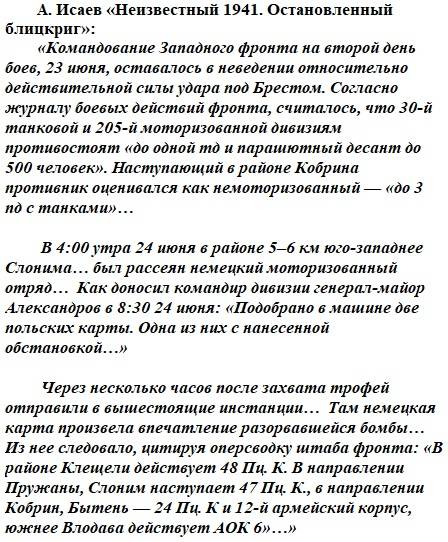
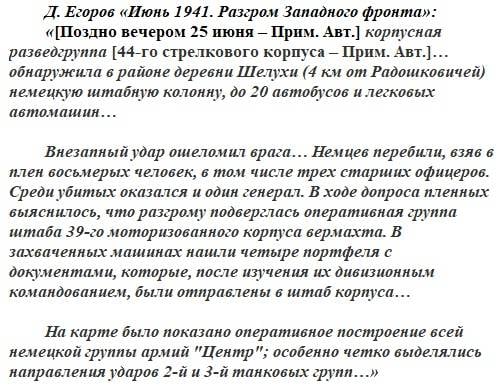
The difference in the German grouping at the border in the General Government as of June 22 and 20 is the appearance of:
- in the northern sector - a motorized regiment, and in the depths of the territory a new infantry division was added;
- in the central sector - five infantry divisions near the border;
- in the southern sector - 1–2 infantry divisions near the border and to the west - two more infantry divisions and a motorized regiment.
With regard to southern Poland, RU could have done the same as with the group at Suwalki.
Until June 20, there were no new 10 infantry divisions in this part of Poland, and on June 22 they appeared.
At the same time, there are no new infantry divisions on the map of the headquarters of the Southwestern Front. It turns out that the RM about new divisions should have entered the RU from Poland.
But, it is generally known that since June 18, columns of wheeled units of motorized and tank divisions moved along the roads of Poland to the border, and tracked units of the same divisions with a part of artillery moved along the railways. It is unlikely that they can be mistaken for infantry divisions ...
Probably, the German grouping was increased in RU, citing a certain message ...
Misinformation, like on the eve of the war, about the presence of a German group in Slovakia and Hungary continues.
In Slovakia - 2 more divisions appeared and in Hungary - 2–4 more divisions.
The same is the case with disinformation about the German group in Romania.
It increased by two more tank and two infantry divisions.
Unreliable RM served as the basis for making incorrect decisions by the leadership of the spacecraft and the Soviet Union ...
Ahead, the country, people and leaders were waiting for many years of a deadly war ...
Conclusion
Our country won that terrible bloody war! The Soviet people, the leaders of the Soviet Union and the army and navy have brought the country into the category of superpowers!
In the future, Stalin was treated in the same way as with General DG Pavlov.
When the fate of the former commander of the Western Front was being decided, Mehlis said: "Comrades, we must think about how to explain to the party, to the people, to the whole world, why the KA is retreating."... For the sake of justifying the mistakes of the intelligence, the leadership of the spacecraft and the party, DG Pavlov was shot.
After Stalin's death and the victory of a certain group of people for power, political and military leaders decided to explain to the people and the whole world the reason for the defeat of the spacecraft in 1941: Stalin was to blame for everything ...
PS
It took the author over a year to complete the article.
Readers who, when reading the article, had more positive emotions than negative ones, the author asks not to forget to put an asterisk.
Happy New Year 2022!
Health to you and your loved ones, dear members of the forum and employees of the site "Military Review"!
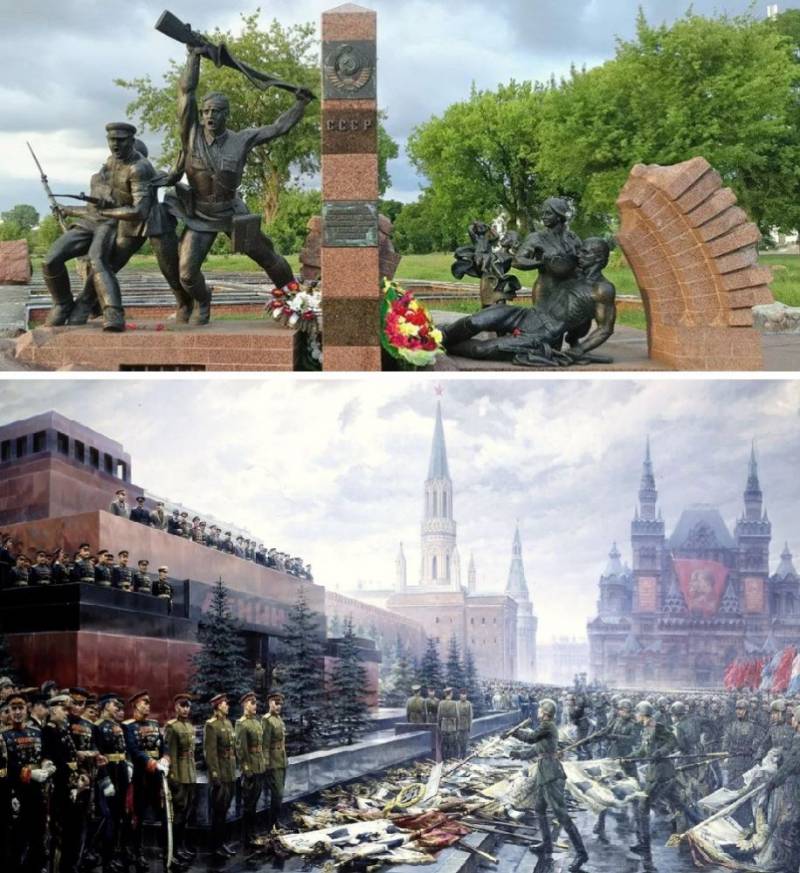
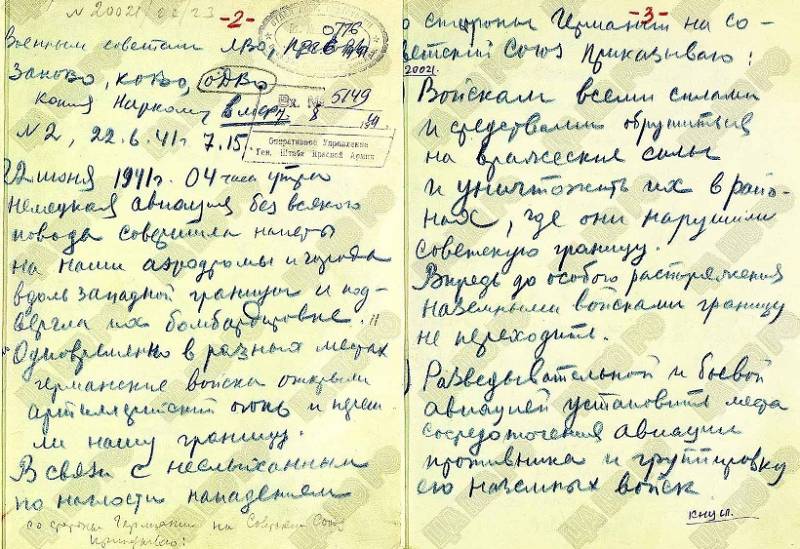
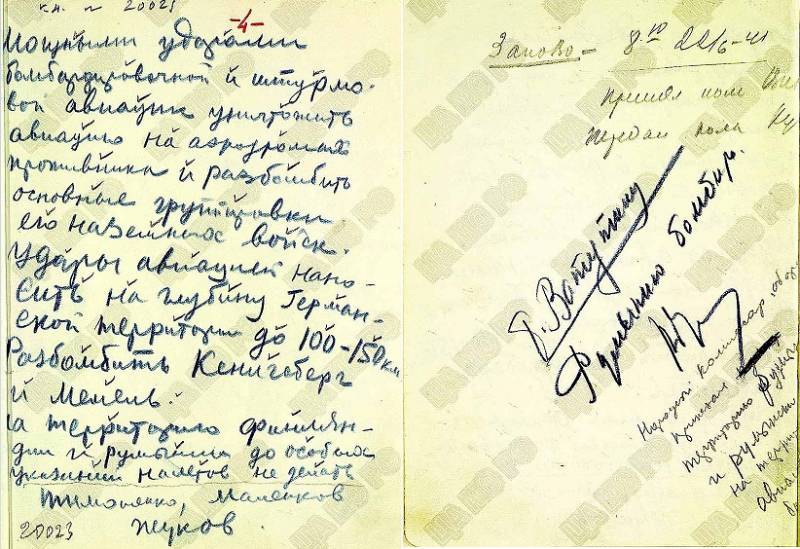
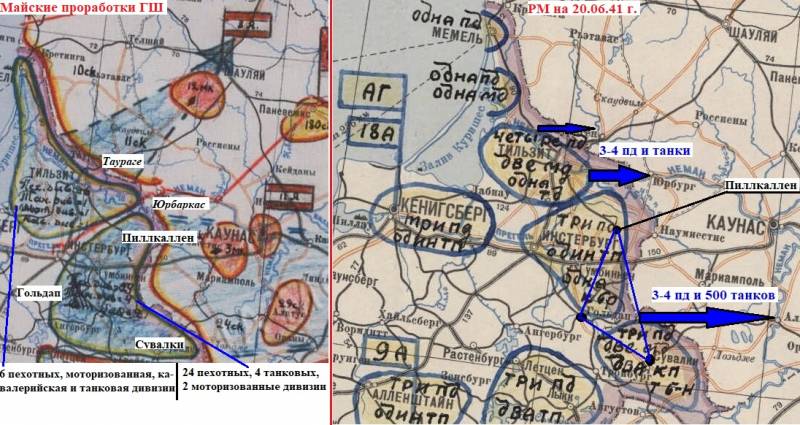
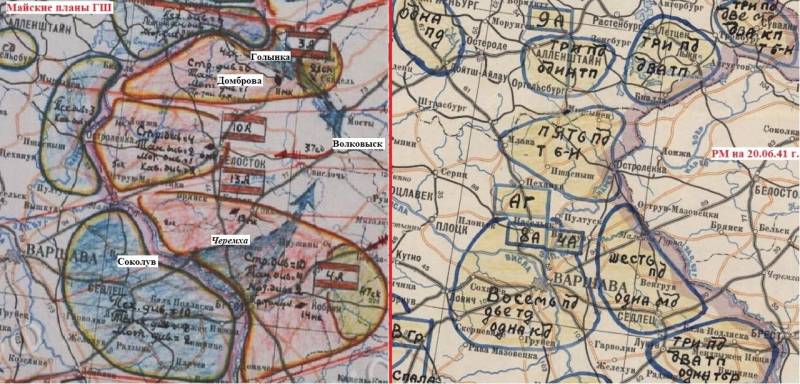
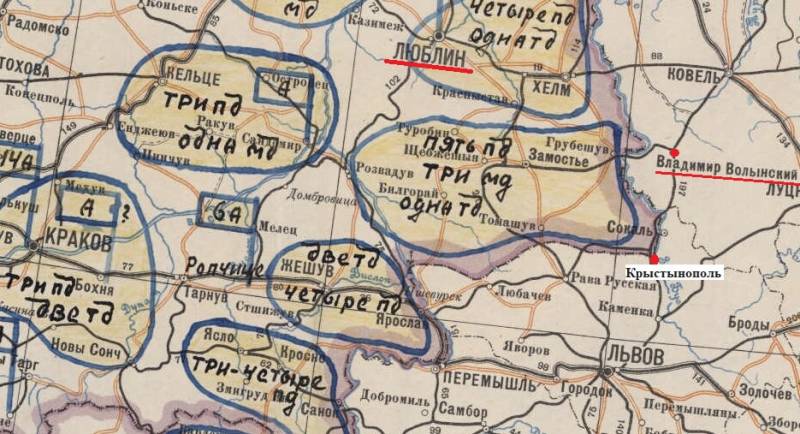
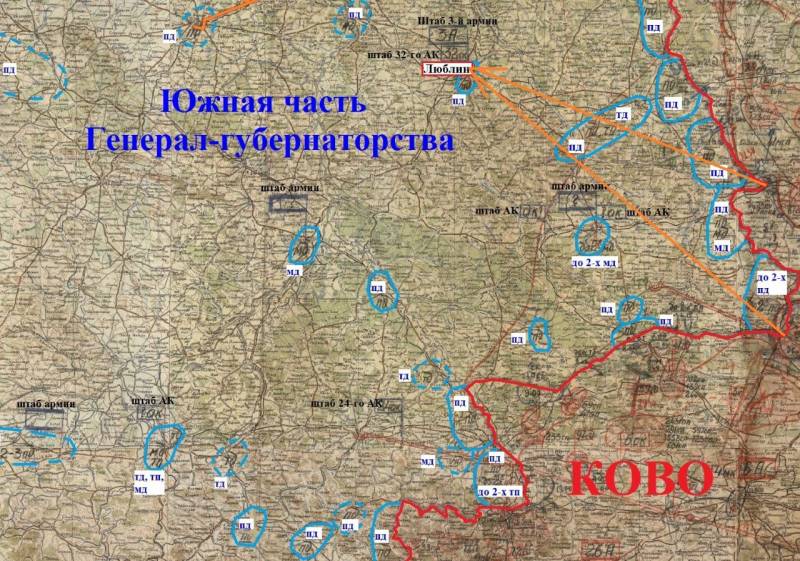
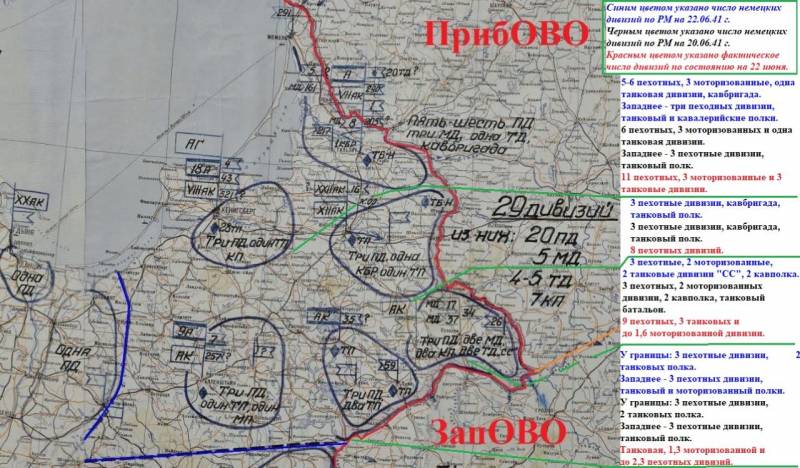
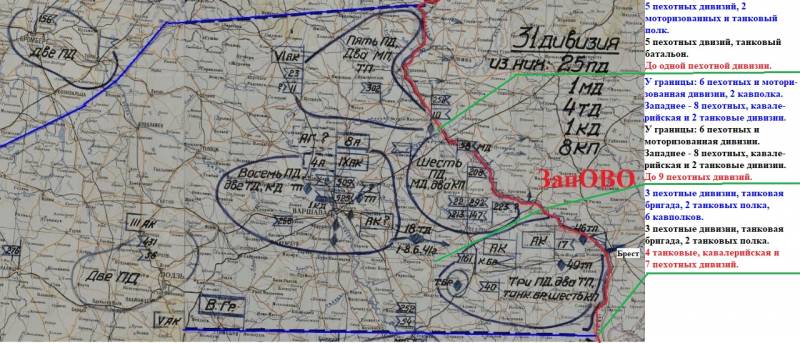
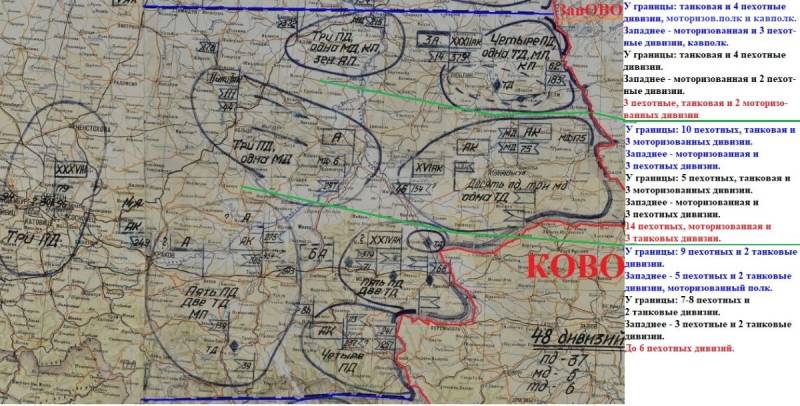
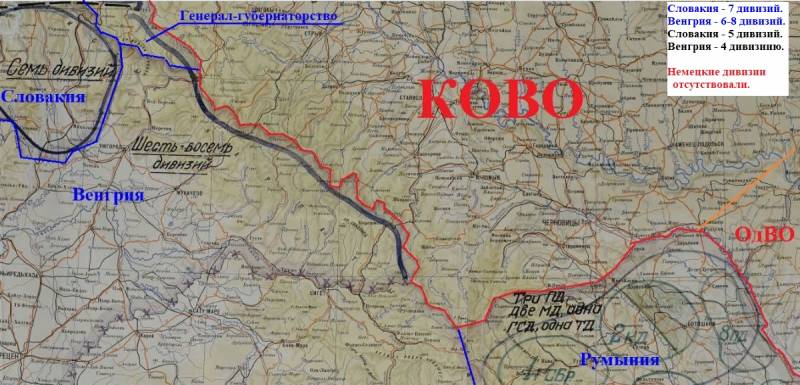
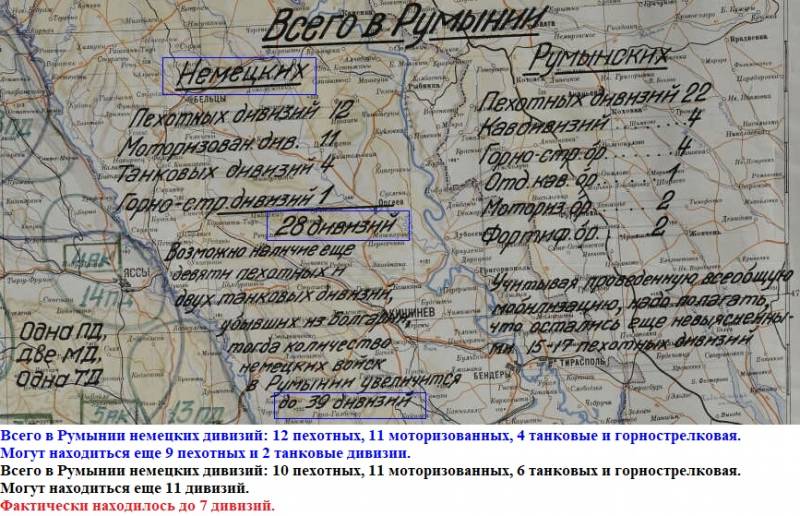
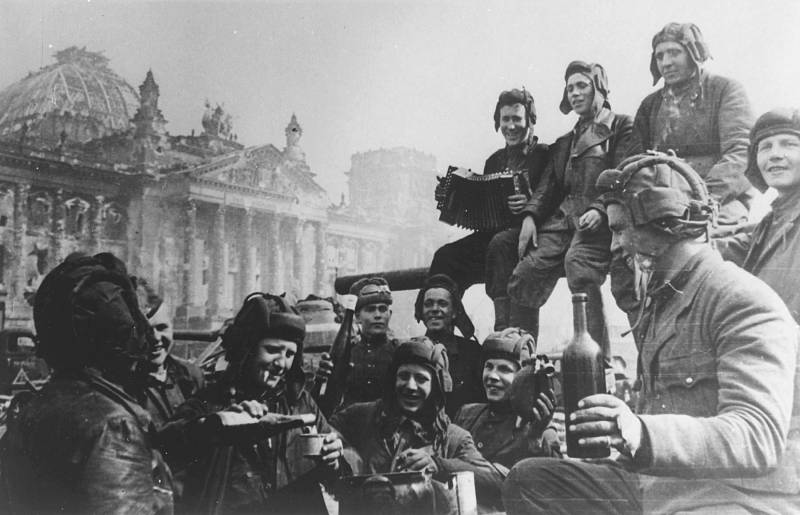
Information